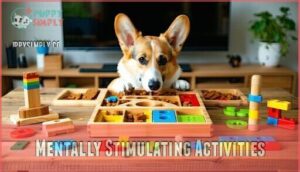This site is supported by our readers. We may earn a commission, at no cost to you, if you purchase through links.

Think of them as furry toddlers who need structured activities, training sessions, and interactive play to stay happy. Their sharp minds get bored quickly, leading to mischief if left unstimulated. You’ll need several hours of focused engagement daily, including puzzle toys, socialization, and consistent training to channel their natural herding instincts.
Understanding the specific signs of an under-stimulated corgi can save your furniture and sanity.
Table Of Contents
- Key Takeaways
- Reasons Not to Get a Corgi
- Attention-Seeking Nature
- Signs of Aggression
- Training Tips
- Mentally Stimulating Activities
- Other Considerations
- Meeting Their Needs
- Frequently Asked Questions (FAQs)
- Do Corgis have behavioral problems?
- Are corgis needy?
- Do Pembroke Corgis need attention?
- Do Corgis need a lot of exercise?
- Do Corgis need grooming?
- Why do Corgis get so excited?
- Are Corgis prone to any specific health problems?
- How much does it cost to own a Corgi?
- Can Corgis be left alone for long periods of time?
- Are Corgis good with children and other pets?
- Conclusion
Key Takeaways
- You’ll need several hours of focused engagement daily – Corgis require constant mental stimulation, training sessions, and interactive play to channel their herding instincts and prevent destructive behaviors like excessive barking and furniture chewing.
- They’re prone to serious attention-seeking behaviors when neglected – Without adequate companionship, you’ll see persistent following, bringing toys as peace offerings, and separation anxiety since 14-20% of dogs experience this issue, with Corgis being particularly vulnerable.
- Their health issues demand ongoing attention and expensive care – You’ll face costly treatments for hip dysplasia, eye problems, and heart disease, plus regular vet visits that can drain your budget faster than expected.
- Proper training and socialization aren’t optional – You must provide consistent daily routines, early socialization, and structured activities to prevent territorial behavior, resource guarding, and aggressive tendencies from taking over your household.
Reasons Not to Get a Corgi
While corgis make wonderful companions for the right families, they’re not suitable for everyone due to their demanding nature and potential health challenges.
You’ll face significant commitments including daily exercise needs, expensive veterinary care for genetic conditions like hip dysplasia, and managing their strong herding instincts that can lead to behavioral issues without proper training.
Health Concerns Abound
Behind those adorable stubby legs and sweet faces lurk serious Corgi health concerns that’ll test your wallet and patience. These lovable pups are unfortunately prone to several genetic conditions requiring ongoing veterinary care and disease prevention strategies:
Those cute stubby legs hide expensive vet bills and genetic health problems waiting to happen
- Hip Dysplasia – Joint malformation causing pain and mobility issues
- Eye Problems – Including cataracts and progressive retinal atrophy
- Elbow Dysplasia – Another joint condition affecting front legs
- Heart Disease – Various cardiac conditions requiring monitoring
Don’t let their cute factor fool you—these health issues demand expensive treatments, specialized nutrition advice, and regular vet visits that can drain your bank account faster than you can say "who’s a good boy?
Prone to Behavior Issues
Beyond health problems, corgis develop serious behavioral issues when their needs aren’t met. Without proper mental stimulation and socialization techniques, they’ll exhibit destructive chewing, excessive barking, and aggression. These behavioral triggers stem from canine anxiety and boredom.
| Issue | Cause |
|---|---|
| Destructive chewing | Insufficient attention |
| Persistent barking | Lack of mental stimulation |
| Aggression | Poor socialization |
| Following owners | Need for emotional support |
Not for Everyone
These behavioral issues make corgis unsuitable for many households. The Corgi Lifestyle demands serious Owner Commitment – they’re genuinely High Maintenance dogs. Without proper Breed Research, you’ll face constant attention needs, aggressive behavior, and separation anxiety.
Many owners underestimate their requirements, leading to rehoming situations. Honest Owner Suitability assessment prevents heartbreak for both you and your potential pet.
Attention-Seeking Nature
Your Corgi’s attention needs go far beyond wanting a quick pat on the head. These intelligent herding dogs form incredibly strong bonds with their families, making them champions of attention-seeking behaviors. When your furry friend doesn’t get enough social interaction, they’ll let you know through persistent barking, following you from room to room, or bringing toys as peace offerings.
Research shows that 14-20% of dogs experience separation anxiety, with Corgis being particularly vulnerable due to their attachment tendencies. Your pup craves mental stimulation and emotional support—it’s hardwired into their DNA from centuries of working closely with humans.
Here’s what drives their attention-seeking nature:
- They’re social butterflies – Corgis genuinely suffer when left alone for extended periods
- Boredom becomes destructive – Lack of attention transforms into chewed furniture and endless vocalizations
- Your attention is their reward – Every response reinforces their behavior, creating a cycle
Meeting their playtime requirements isn’t optional—it’s necessary for their wellbeing. Understanding dog training methods can help address attention-seeking behaviors in Corgis.
Signs of Aggression
You’ll recognize aggressive behaviors in your corgi when insufficient attention combines with their natural herding instincts, creating territorial displays and resource guarding issues.
These warning signs often emerge gradually, so catching them early prevents more serious behavioral problems from developing.
Territorial Behavior
When your Corgi shows aggressive behavior toward visitors, you’re witnessing territorial behavior rooted in their herding instincts. This space protection stems from pack dynamics where they defend their domain through boundary setting and territorial marking.
| Territorial Trigger | Behavior Signs | Management Strategy |
|---|---|---|
| Doorway Guarding | Blocking entry, growling | Redirect to designated spot |
| Visitor Aggression | Barking, lunging | Controlled introductions |
| Space Protection | Resource defense of areas | Establish clear boundaries |
| Pack Dynamics | Attention-seeking dominance | Consistent leadership training |
| Territorial Marking | Indoor/outdoor marking | Supervised outdoor time |
Resource Guarding
When your Corgi starts hoarding toys or showing food aggression, you’re witnessing resource guarding in action. This canine possessiveness stems from an instinct to protect valuable items, but it requires immediate attention to prevent escalation.
Address resource guarding issues through these proven methods:
- Trade, don’t take – Offer high-value treats when removing guarded objects
- Practice resource sharing during calm moments with positive reinforcement
- Create structured feeding routines to reduce food-aggressive behaviors around meals
Object guarding isn’t just stubbornness—it’s your dog’s way of communicating anxiety about losing something precious.
Training Tips
You’ll find that effective training transforms your high-energy corgi from a demanding attention-seeker into a well-behaved companion who understands boundaries.
Consistent training methods and early socialization aren’t just helpful—they’re essential for preventing those infamous corgi behavioral quirks from taking over your household.
Socialization
Most Corgis thrive on social bonds built through early puppy training. Proper socialization during the critical two-to-fourteen week window prevents attention-seeking behaviors and aggressive tendencies.
Essential socialization includes exposure to:
- New environments – parks, streets, different surfaces
- Human interaction – strangers, children, various ages
- Canine communication – friendly dogs, different breeds
- Environmental exposure – sounds, textures, experiences
Your Corgi’s individual personality shapes their social interaction needs. Effective training requires understanding of corgi socialization techniques to guarantee a well-adjusted adult dog.
Consistency
Five key principles create the foundation for successful Corgi training. Daily routines and consistent training methods accelerate learning while reducing confusion. Your Corgi needs scheduled play and regular interaction for emotional support. Mental stimulation through structured activities prevents behavioral problems. Effective training also relies on utilizing the right Corgi training tools to achieve desired outcomes.
| Consistency Factor | Training Impact |
|---|---|
| Same commands daily | Faster obedience response |
| Regular schedule | Reduced anxiety levels |
| Structured attention | Better behavioral outcomes |
Remember: inconsistent discipline creates stubborn pups who’ll outsmart you every time.
Mentally Stimulating Activities
Training alone won’t satisfy your Corgi’s exceptional mind – they need ongoing mental stimulation activities to stay balanced. These herding dogs thrive when their intellect gets a proper workout through targeted brain training sessions.
- Puzzle Toys: Interactive feeders and treat-dispensing toys turn mealtime into mental exercises. Your pup’ll work for every kibble, keeping their problem-solving skills sharp while preventing boredom-induced mischief.
- Play Challenges: Create treasure hunts using their nose-work instincts. Hide treats around the house or teach new tricks that require attention and focus. These mental stimulation games satisfy their need for cognitive engagement.
Engaging in cluster training games can also help improve your dog’s mental sharpness and physical fitness.
Other Considerations
Beyond mental stimulation, you’ll need to take into account your corgi’s grooming demands, potential health complications, and ongoing attention requirements.
These factors can substantially impact your daily routine and budget, so it’s wise to understand what you’re signing up for before bringing home your furry friend.
Attention and Playtime Needs
Beyond mental enrichment, your Corgi’s playtime requirements demand serious attention. These energetic herders need 30–45 minutes of structured exercise daily to prevent attention deficits and behavioral issues. Short, frequent play sessions work better than marathon outings.
Social interaction through dog parks and playdates satisfies their herding instincts while providing essential mental stimulation and socialization opportunities. Providing the right Corgi toy selection options can also help in keeping them engaged and active.
Grooming Requirements
That thick double coat isn’t just for show—it’s a full-time commitment. Your Corgi’s grooming requirements demand weekly brushing sessions, escalating to daily during shedding seasons. Invest in quality undercoat rakes for effective shedding control and proper brushing techniques.
Nail care every few weeks prevents overgrowth, while bathing frequency stays minimal—monthly unless they’ve discovered mud puddles. This coat maintenance routine directly impacts your Corgi’s needs beyond appearance, supporting skin health and reducing household fur tumbleweeds.
Health Issues
While grooming keeps your corgi looking great, health issues require serious attention too. Hip dysplasia affects many corgis, causing joint pain and mobility problems. Eye problems like cataracts can develop without warning. Regular veterinary care and health screening catch issues early. Don’t overlook nutrition advice from your vet either. Understanding common health issues is vital for preventing and managing diseases in dogs.
- Hip Dysplasia – Joint malformation requiring early detection and management
- Eye Problems – Cataracts and progressive retinal atrophy need monitoring
- Veterinary Care – Annual checkups prevent minor issues from becoming major ones
- Nutrition Advice – Proper diet prevents obesity that worsens joint problems
- Health Screening – Genetic testing helps identify risks before symptoms appear
Meeting Their Needs
Successfully meeting your corgi’s needs requires understanding their unique blend of physical energy and emotional intelligence. These herding dogs thrive on structure, interaction, and purposeful activities that channel their natural instincts.
- Daily Exercise: Provide at least 30-60 minutes of physical activity through walks, fetch, or agility training
- Mental Stimulation: Use puzzle toys, training sessions, and problem-solving games to challenge their sharp minds
- Social Interaction: Schedule regular playdates and group activities to satisfy their pack mentality
- Emotional Support: Offer consistent attention, praise, and bonding time to build trust and security
Meeting their needs isn’t about spoiling them—it’s about creating a balanced lifestyle. When you address their nutrition needs with quality food, combine it with mental stimulation through interactive play, and provide adequate attention throughout the day, you’re setting both of you up for success. A fulfilled corgi becomes a well-behaved companion rather than a demanding attention-seeker.
Frequently Asked Questions (FAQs)
Do Corgis have behavioral problems?
Yes, you’ll likely encounter behavioral challenges with corgis. Their herding instincts can trigger nipping, excessive barking, and territorial behaviors.
Without proper exercise and mental stimulation, they’ll develop destructive habits like chewing and attention-seeking behaviors.
Are corgis needy?
Certainly, corgis can be clingy companions! You’ll discover these devoted dogs crave constant connection, seeking security through your steady presence. Their herding heritage makes them naturally attentive to their owner’s every move, creating beautifully bonded but sometimes demanding relationships.
Do Pembroke Corgis need attention?
Pembroke Welsh Corgis thrive on human connection and require substantial daily attention.
You’ll need to provide mental stimulation, physical exercise, and social interaction to prevent destructive behaviors like excessive barking or chewing.
Do Corgis need a lot of exercise?
Wonder if your furry friend’s restlessness stems from pent-up energy? Absolutely, corgis need substantial daily exercise—at least 30 minutes—to prevent obesity, destructive behaviors, and restlessness from their herding heritage.
Do Corgis need grooming?
Corgis absolutely need regular grooming due to their thick double coat. You’ll brush them several times weekly to control shedding and prevent matting, especially during seasonal coat changes.
Why do Corgis get so excited?
Your herding breed’s excitement stems from their genetic wiring for high-energy work. They’re naturally wired to be "on" constantly, channeling centuries of sheep-herding instincts into modern life’s daily adventures.
Are Corgis prone to any specific health problems?
Yes, you’ll need to watch for hip and elbow dysplasia, eye conditions like progressive retinal atrophy, and degenerative myelopathy. Their long backs also make them susceptible to intervertebral disc disease.
How much does it cost to own a Corgi?
Owning a Corgi usually costs $1,000 to $2,500 a year, including food, vet visits, grooming, and toys. Prepare for surprise expenses—hip dysplasia treatments and eye exams can turn your wallet into a squeaky toy!
Can Corgis be left alone for long periods of time?
You shouldn’t leave these energetic herding dogs alone for extended periods. They’ll develop destructive behaviors, excessive barking, and anxiety when isolated too long.
Arrange midday breaks or dog-sitting services for workdays.
Are Corgis good with children and other pets?
Like pieces in a puzzle, corgis generally fit well with children and other pets. With proper socialization, they make excellent family companions.
Though their herding instincts may cause heel-nipping behaviors you’ll need to address.
Conclusion
Research shows that 68% of corgi owners report their pets exhibit attention-seeking behaviors within the first six months of ownership. So yes, do corgis need a lot of attention? Absolutely.
These energetic herding dogs require several hours of daily interaction, mental stimulation, and structured activities to prevent destructive behaviors. Without proper engagement, you’ll face excessive barking, furniture destruction, and clingy behavior.
Meeting their attention needs through training, puzzle toys, and consistent companionship ensures a well-adjusted, happy corgi companion.
- https://willothecorgi.com/blog/10-reasons-you-should-get-a-corgi-corgi-temperament-and-the-pros-of-corgi-ownership
- https://lindaksienkiewicz.com/you-sure-you-want-a-corgi/
- https://www.pethealthclub.com/uk/pet-advice/corgi-breed-guide
- https://www.reddit.com/r/corgi/comments/11cjwkk/question_what_toys_or_puzzles_help_occupy_your/
- https://corgibliss.wordpress.com/2018/03/17/fun-games-with-your-corgi/












